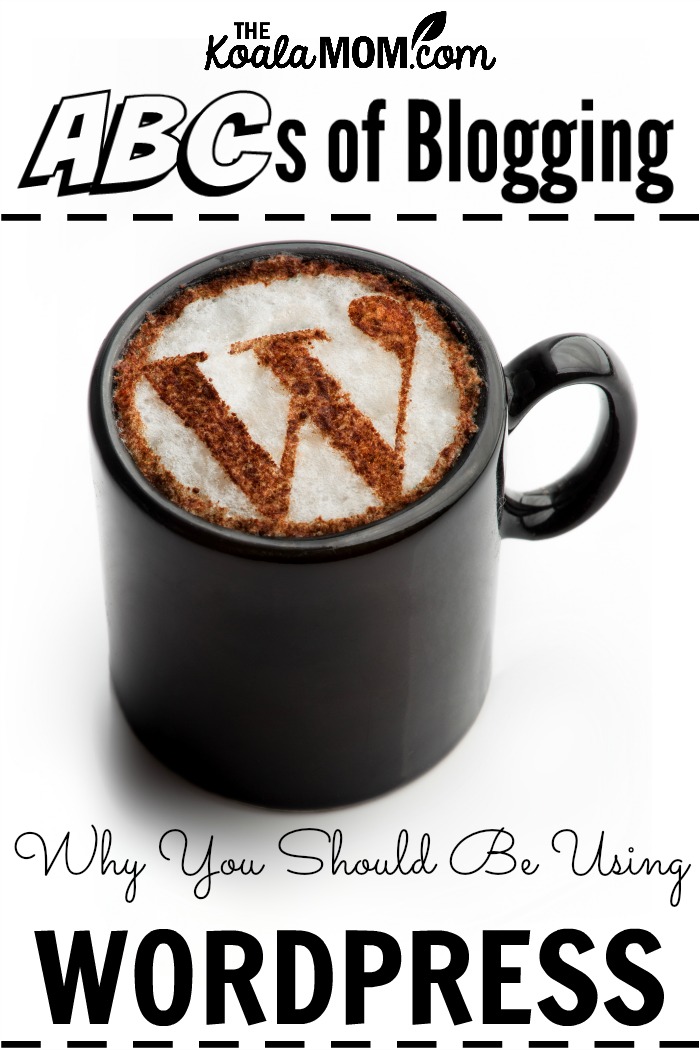I first started blogging ten years ago on Blogger. At the time, I didn’t know that other blogging platforms existed; I simply signed up for an account and started writing. Over the next few years, I had the chance to try using WordPress and other platforms as I wrote for other sites. However, I found these platforms hard to use. I began hearing that WordPress was the best blogging platform out there, but I didn’t like it. Plus, Blogger was doing everything I needed as a blogger.
For seven years, I held onto my love of Blogger and resisted switching. Then, slowly, I began to realize I needed to make the switch. Now that I’ve had a self-hosted WordPress blog for several years, I can’t believe it took me so long to get here. I love using WordPress. It rocks. If you’re also sitting on the fence about what blogging platform to use, here’s why I recommend using WordPress for your blog.

This post contains affiliate links; as an affiliate, I earn from qualifying commissions.
Ownership
As a creative person, ownership of my content matters a lot to me. That’s one of the reasons why, over the last few years, I’ve focused mainly upon this blog and less upon writing for other magazines or newspapers. I own my content here; I publish what when I want, rather than being subject to the whims of another editor.
However, on Blogger (and other free blogging platforms), I didn’t own my content. I was merely borrowing or renting the space in which to put my content, and the landlord (Google) could have shut me down at any time. While I don’t know anyone personally who has had their blog removed by Google, I’ve heard stories of this happening in my blog groups. After 7+ years of blogging, I had a lot of content written and didn’t want to lose that.
Google (and the free version of WordPress) also have restrictions on what you can post and how you monetize your blog. Even if you feel like you know the terms of service, they could change at any time and you could suddenly be in violation of those. If you want to make your blog your job and move forward as a professional blogger, then you need to own your blog.
Organization
I’ve mentioned before that I’m a bit of a neat freak and love organization. That was a very big reason for me to switch from Blogger to WordPress. WordPress offers the ability to organize your posts using categories and tags. This should make it easier for your readers to browse your content and find what they are looking for. For more about this, check out Organizing Your Blog.
WordPress also offers a host of themes, ranging from free to pricey, for your blog. These themes are basically the design of your blog—its organizational structure. Once you’ve picked a theme, you can still customize it using plugins (below) and other options. When I first switched, I saw other blogs who were using the same theme I was, but we’d all customized our blogs to our tastes and needs.
A good theme makes a huge difference in the organization, readability, and attractiveness of your blog.
Plugins
Plugins didn’t make sense to me until I started using WordPress. They are, basically, an add-on to your blogging platform that allows you to do more and to customize your blog. As the catch phrase goes, there’s a plugin for that. I currently use plugins to catch spam, tweet old posts, allow readers to contact me, delete post revisions, and more. Plugins are super easy to install and use and can be deleted when they are no longer needed.
Support
Switching to a self-hosted WordPress site means that I have support when something goes wrong with my blog. Google, I’m afraid, isn’t terribly helpful when you need any information from them (let’s just say that comment comes from experience). My blog is hosted with BigScoots and I have always had rockstar service from them. When I have a question or problem with my blog, I call them up and they fix it—even if I caused the problem.
SEO
One of the reasons I clung to my Blogger blog for so long was that I figured since it was owned by Google, then surely Google would prefer it in searches. Wrong. WordPress offers so many more options for search engine optimization. The Yoast plugin provides a handy checklist for each post, including an easy way to alter your meta description, slug, and blog title. You can also do more in your blog code to make it easier for search engines to find you.
You can also do WordPress image optimization fairly easily by either using plugins or by hopping into your servers command line. There are plenty of guides out there that will help you do this in less than an hour. If you were using a HTML website for example, optimizing your images might take you all day!
Easy to Use
As I mentioned, I did have the chance to try out WordPress before buying it by writing for other blogs. Most of my experience came from helping Susan from 5 Minutes for Mom with her site during a mentorship program she hosted. It was great to get a behind-the-scenes look at her blog and see just how much WordPress could do for me. There is a learning curve involved when switching from Blogger to WordPress, but once you’ve gotten used to WordPress, it is so easy to use.
I am not a tech geek; I’m a writer. I know some basic HTML but often rely on Google searches and copy/paste to do anything with my blog. While I know other bloggers who love playing with the code and CSS on their blogs, I know the right people to ask when I want something like that done. So if tech scares you, then don’t worry; WordPress is easy to use. Plugins are easy to install and take care of all the coding stuff without you having to know it. If you are a tech person who likes to do more with your site, then WordPress also makes it easy for you to tweak your CSS and HTML to customize your blog.
 If you’ve switched from Blogger to WordPress, what motivated you to start using WordPress? If you haven’t, why not?
If you’ve switched from Blogger to WordPress, what motivated you to start using WordPress? If you haven’t, why not?

One Response
Bonnie, so many people sing the praises of WordPress but I have to juggle my needs as a singer/songwriter AND author which means that last year I opted to go with Bandzoogle which has a built-in capacity for me to sell my music right on my site via download. Can WordPress do that? There are a lot of WordPress features–I learned about a few plug-ins this past weekend at Write Canada–that I like, but I have to juggle my needs as a recording artist and an author. Any comments?